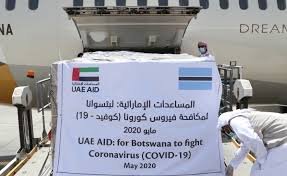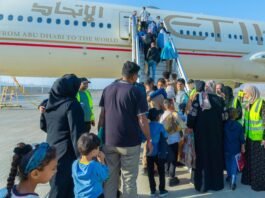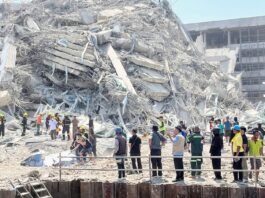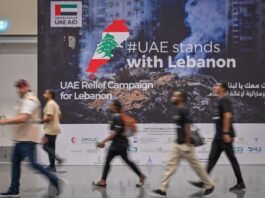Introduction to the Humanitarian Assistance
The United Arab Emirates (UAE) has demonstrated a steadfast commitment to global humanitarian efforts, particularly in times of crisis. Recently, the country has turned its attention to Botswana, where a pressing public health emergency has arisen. The situation in Botswana necessitated urgent medical assistance, prompting the UAE to mobilize resources to deliver vital aid. This scenario reflects the UAE’s broader commitment to international cooperation and solidarity in addressing health crises around the world.
The escalation of health issues in various regions presents substantial challenges, often surpassing local capabilities to respond effectively. In Botswana, this urgency was compounded by a public health emergency that put immense pressure on existing medical infrastructure. The need for international aid became critical, as the influx of medical supplies and assistance is essential to overcoming these dire situations. The UAE’s involvement underscores the importance of global partnerships and the collective effort needed to alleviate suffering and restore health and well-being in affected communities.
International aid plays a pivotal role in crisis management, offering not only immediate relief through the provision of medical supplies but also long-term support to rebuild healthcare systems. Countries like Botswana often rely on external assistance to bridge gaps in their medical resources, allowing health professionals to provide essential services to those most in need. The UAE’s intervention exemplifies the power of humanitarian assistance in reducing the impact of health crises while fostering a spirit of unity among nations in the face of adversity.
As the UAE continues to enhance its global humanitarian profile, its actions in Botswana stand as a testament to the nation’s dedication to addressing pressing health challenges and serving those affected by calamities. Such initiatives not only reflect the UAE’s values of compassion and generosity but also reaffirm its commitment to improving health outcomes on a global scale.
Details of the Medical Supplies Delivered
The recent humanitarian initiative undertaken by the UAE to deliver crucial medical supplies to Botswana underscores the nation’s commitment to global health and welfare. The shipment comprised a well-curated assortment of medical supplies aimed at addressing various health challenges faced by the country. Among the key items included in this aid package are essential medicines for chronic conditions, which are critical for the management of diseases such as diabetes, hypertension, and cardiovascular ailments.
In addition to pharmaceutical supplies, the shipment featured a range of surgical equipment, which is vital for healthcare facilities striving to provide adequate care to patients requiring surgical interventions. The availability of such equipment not only enhances surgical capabilities but also contributes to improving patient outcomes. Alongside these supplies, the shipment contained materials necessary for basic medical care, including bandages, antiseptics, and intravenous fluids, which serve as foundational components of healthcare delivery.
The significance of these medical supplies cannot be overstated. They play an integral role in strengthening the health sector of Botswana, particularly during periods of increased demand for medical services. Access to this crucial aid helps to alleviate the burden on local healthcare systems, ensuring that medical professionals are equipped to address the needs of their patients effectively. Furthermore, the timely delivery of these supplies reflects a proactive approach to fortifying Botswana’s healthcare infrastructure, fostering resilience in the face of various healthcare challenges.
Moreover, the collaborative effort involved in this humanitarian response showcases the importance of international partnerships in tackling health-related issues. By providing vital medical supplies, the UAE aids Botswana in enhancing the overall quality of care available to its population, ultimately contributing to better health outcomes across the nation.
Statements from UAE Officials and Their Implications
In recent remarks, Dr. Tareq Ahmed Al Ameri, Chairman of the UAE aid agency, underscored the pivotal role that medical aid plays in addressing the pressing healthcare needs of nations like Botswana. Dr. Al Ameri emphasized that the humanitarian efforts extended by the UAE are not merely acts of charity, but rather a strategic commitment to enhance public health systems across the African continent. He articulated the belief that providing essential medical supplies and support can significantly aid in combating public health crises, which are often exacerbated by limited resources in developing nations.
The statistics surrounding healthcare challenges in Botswana serve as a backdrop to these efforts. With rising incidences of diseases and limited access to quality healthcare, the UAE’s provision of aid is timely and necessary. This initiative reflects the UAE’s broader objective to establish itself as a key player in global humanitarian efforts, with a specific focus on fostering sustainable development in Africa. Dr. Al Ameri’s statements present a strong correlation between such humanitarian missions and the strengthening of diplomatic ties between the UAE and African nations.
Furthermore, the Chairman articulated that the UAE’s commitment extends beyond the immediate relief; it focuses on future resilience through collaborative health initiatives. By working alongside local governments and health organizations in Botswana, the UAE aims to fortify healthcare infrastructure and create a model for future assistance efforts. This positions the UAE as a reliable partner, keen on not only addressing present challenges but also ensuring long-term health stability within the region.
Through these strategic initiatives, the UAE aims to build meaningful relationships with African countries, fostering mutual understanding and support. The implications of Dr. Al Ameri’s insights highlight the vision that drives UAE’s humanitarian actions, underlining their vital role in the larger context of international health collaboration.
The Impact on Botswana’s Health Sector
In light of the recent medical assistance provided to Botswana, it is critical to analyze the potential short- and long-term effects on the country’s healthcare system. The influx of vital medical supplies is expected to significantly enhance the capacity of local health services. Immediate benefits may include improved management of diseases that disproportionately affect vulnerable populations, such as children, women, and the elderly. These groups often lack access to adequate healthcare resources, making the arrival of additional medical aid particularly crucial.
The short-term impact of this aid will likely manifest in reduced mortality and morbidity rates among these vulnerable populations. For instance, pediatric care is set to improve, with more resources available to treat childhood illnesses, thereby reducing hospital stays and facilitating quicker recovery. Similarly, maternal health services will benefit, allowing for better prenatal and postnatal care, which is essential for the health outcomes of both mothers and infants.
In tandem with addressing immediate health concerns, this intervention could lay the groundwork for long-term improvements in Botswana’s health sector. Sustainable practices can be established through training programs aimed at local healthcare workers, which would empower them to utilize the new medical supplies effectively and efficiently. By fostering local expertise, Botswana can build resilience within its health services, decreasing dependence on external aid in the future.
Moreover, the availability of enhanced medical resources may encourage health-seeking behaviors among communities. As residents become more aware of the available services, they may proactively engage with health facilities, leading to better disease surveillance and prevention. Over time, this could result in a healthier population and an overall stronger healthcare system.
In conclusion, the humanitarian response from the UAE has the potential to catalyze significant advancements in Botswana’s health sector, improving both immediate healthcare access and long-term health outcomes for its most vulnerable members.




